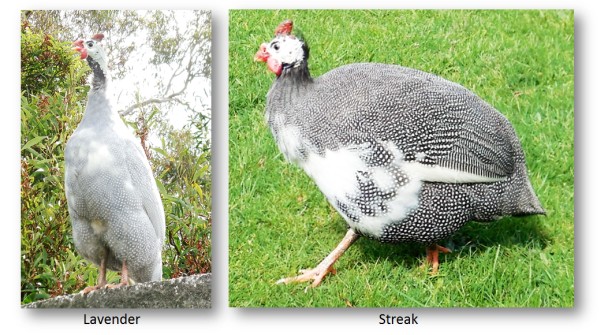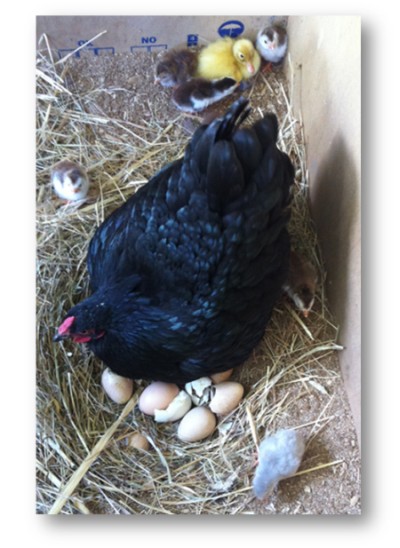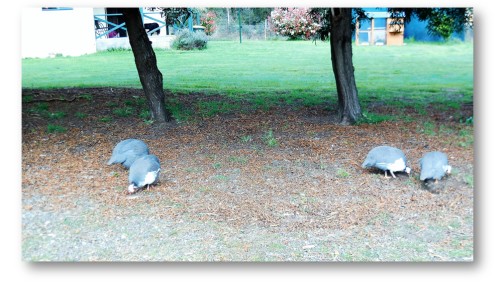
Guinea Fowl Facts is a continuation of 3 articles documenting events from the egg to the current mating season of our guinea fowls.
Some Guinea Fowls Facts We Weren’t Prepared For…
This guinea fowl information has come about purely through my own experience. Starting the journey as a complete novice, I knew not a thing about how to raise guinea fowl keets.
Caught by Surprise
Thrown in at the deep end with an unexpected clutch of little keets, that’s the name of guinea chicks, it caught me totally by surprise! Truth is, although I had set the eggs under a broody hen myself, when I tested the eggs at about 1 week I thought none of the eggs were good. I was half expecting that to be so as I had the eggs for some time before a hen went broody for me to use.
How wrong I was! I’ve since learned that the test should have be done at about 2 weeks, which most probably would have told a different story. I decided to just leave the hen there because you never know, but I really didn’t expect any to hatch.
What’s all that noise?
 It was one day when my son (Trent) went to let the birds out in the morning, he came up saying that he could hear a lot of noise going on in the box. I ran straight down there and upon lifting the lid, 9 pairs of eyes were staring up at me… the mum, 7 keets and 1 duckling. (I had set a few duck eggs under her also for good measure).
It was one day when my son (Trent) went to let the birds out in the morning, he came up saying that he could hear a lot of noise going on in the box. I ran straight down there and upon lifting the lid, 9 pairs of eyes were staring up at me… the mum, 7 keets and 1 duckling. (I had set a few duck eggs under her also for good measure).
There I was, catapulted into a new season, both in their lives and mine. I’ve covered much about guinea fowl care in the links below. You can definitely say I’ve learned by experience. Of-course, Google has helped me along the way too.
- How to Raise Guinea Fowl Keets (up to 8 weeks old)
- Care for Guinea Fowl Facts – Part 2 (facts and features)
- Care for Guinea Fowl Facts – Part 3 (facts and stories)
- Guinea Fowl Facts – Prepare for Mating (this page)
Our broody hen called Whitefeather continued to sit almost another week longer than hens normally do. Chicks usually hatch at about 21 days, but guinea fowl and ducks take about 28. She didn’t even hesitate, so determined was she to bring forth her little ones. She produced:
- 5 Pied Pearl Gray keets*
- 1 Pearl Gray keet
- 1 Lavender keet
- and one little Peking duckling!
* There are many different varieties of guinea fowl of which we have 3 types. Any variety can be “pied”, which simply means various degrees of white feathers covering their chest and wings.
Out of the 7 keets hatched, 2 were girls and 5 were boys.
Over time, the duckling gradually made the transition to the other ducks, although she continues to spend time with all our birds. They all love her and she’s so caring of them all, especially if there is some trouble with the keets… like they have accidentally flown onto the other side of the fence. She runs over to them quacking as she goes, most upset they are not where they should be. Don’t you love it!
Sorting the Pecking Order
All the keets got along together quite famously, roaming around our grounds with all the other birds. Rarely was there any arguing between them, except while they were still quite young they’d chase the lavender mercilessly as they obviously believed he didn’t belong with them because of his different colour. I found this most upsetting as the lavender was my favourite.
Lavender took refuge amongst the hens who accepted him totally. Even the rooster didn’t have a problem with him.
Then at about 6 months occasional fights broke out between the males. This, I believe, was the young males beginning to sort out their mating rights. There was one major fight between a couple of them that went on for hours. I caught some of it here:
Mating Calls Begin
At about 9 months, or was it 10… it kind of crept up on me so I didn’t specifically document when it began… the females began their endless calling. From what I understand, they were calling for a male. They were getting ready to mate. Meanwhile, the males didn’t seem to take any notice of it. I used to wonder why they didn’t tell them to “shut-up!”
The girls called “buck-wheat” over and over, and over, and over… and over… endlessly. They would do it anywhere, but preferred to be high up somewhere, like the roof of the shed, or house… or on top of the tank … or into one of our many blackwood trees. They’d lift their head up high and go for it. To us, it was for no apparent reason… surely their throats would get sore!
During this period of time, because only the girls made all the noise, we were under the impression that although the females made such a racket, the boys were all very quiet. We began to think this is the way it is… and would be… forever!
Maybe after about a month, the whole situation took a turn for the worse! Suddenly the males found their voice! Oh-oh, what is all this?xx
Now with both males and females calling, it brought trouble into our camp… the males of my household were most intolerant of all the noise. Much discussion took place as to what we should do. Maybe I would have to get rid of all my “babies”, which was a little upsetting. Fortunately for us, we have no close neighbours, as I’m sure they would have told us they have to go.
Bonded Couples
 Then one day, to our surprise, we noticed that 2 of the boys had paired up with the 2 girls. We now had 2 couples. Our Pearl Gray had bonded with one of the Pied females, and the other Pied female had bonded with a Pied male. One pair would go off in one direction, while the other pair went in another. As a couple, they do everything together.
Then one day, to our surprise, we noticed that 2 of the boys had paired up with the 2 girls. We now had 2 couples. Our Pearl Gray had bonded with one of the Pied females, and the other Pied female had bonded with a Pied male. One pair would go off in one direction, while the other pair went in another. As a couple, they do everything together.
I watched them for a couple of days to make sure they were truly bonded as I thought maybe they were swapping partners. But as it turned out, they’ve remained together with their own special partner. I have Mr & Mrs Pearl, and Mr & Mrs Spot Pied!
Now I was left with 3 batchelor boys! Oh no! But as I didn’t want to part with any of them, I decided to wait and see what to do down the track. Well, I’m at that stage now, aren’t I.
Someone offered to buy a pied. Oh I didn’t want to do this… but something had to be done, so I sent him off to a home where he is lord of the manor… just him and his own 3 girls. I’m not at all worried for him now as I know he finds life good! It was sad to see him go though.
So now there are 2 bachelors…

Tranquility Restored
A few more days passed by
and I began to realise…
all the noise had quietened down.
It was amazing!
Now the penny dropped! All the noise was just them preparing for mating season. The girls first, and then the boys, both with their individual calls. You see, when the girls began all that constant calling, instead of me thinking I needed to provide more females for the boys, I thought I’d rather get rid of the girls and only keep boys. Boys are quiet, girl are loud… or so I thought.
But this was only as we were going through it, when we didn’t comprehend what was going on.
Meanwhile, Lavender is very bonded with the chooks and is happy to wander around with them all day, but he won’t have Streak being part of the group. I feel sorry for Streak. I guess what goes round, comes round. He’s getting his own back!
Let’s Find Some Cuties for my Bachelor Boys
 So now that they’ve quietened down, I’ve made the decision to play cupid and find 2 more females to fall deeply in love with my bachelor boys. Although Lavender was always my favourite, Streak has become quite close to me… and he’s the only one that will eat out of my hand. He does other quite cute things too that let me know we have a special thing going… something I don’t have with any of the others.
So now that they’ve quietened down, I’ve made the decision to play cupid and find 2 more females to fall deeply in love with my bachelor boys. Although Lavender was always my favourite, Streak has become quite close to me… and he’s the only one that will eat out of my hand. He does other quite cute things too that let me know we have a special thing going… something I don’t have with any of the others.
When I finally get the 2 new females, which I hope won’t be too long as it’s hard being a bachelor boy especially when the only girls in sight have been taken… and jealously guarded I might add… I know they’ll need to be locked up together in their pairs in separate quarters for a couple of weeks. This is to allow them to find love and bond together and not have any hussy females fluttering eyelids at other boys instead!
You know, if I’d allowed the men in my household to have their way, we would have sold the guinea fowl during that extremely noisy period, and I would never have known the outcome. I would have spent the rest of my life believing that guinea fowl, as they mature, are always very noisy birds.
Call of the “Watchdogs”
I must tell you that all of them will still call out if they are worried about anything not being quite right around the property. Guinea fowl are like watch dogs, in fact, many think they are better than a watch dog. They are extremely brave and will sound the alarm at any intruder, whether it be hawks overhead, or snakes in the grass. So far we’ve definitely experienced them driving the hawks away (thankfully) but so far we’re not aware of any snakes. Hope it stays that way!
I am so thankful they have quietened down as the peace and tranquility of our place has been more or less restored. What I can’t tell you at this time is whether they mate for life, or will we have to go through all this again next year?
Guinea Fowl Facts – Wikipedia say they normally mate for life.
I believe the 2 females should be laying eggs now, but I’ve not as yet found the nests. I’m led to believe they normally lay anywhere except in the nests the chooks use. They like to create their own nests out in the bushes, in hard to find places. But I guess that’s a story for another time.
Don’t forget to check out my other posts on guinea fowl:
- How to Raise Guinea Fowl Keets (up to 8 weeks old)
- Care for Guinea Fowl Facts – Part 2 (facts and features)
- Care for Guinea Fowl Facts – Part 3 (facts and stories)
- Guinea Fowl Facts – Prepare for Mating (this page)
If you are considering whether or not you should acquire some guinea fowl, I hope this article on Guinea Fowl Facts has helped you to receive more insight and understanding on the different stages the birds pass through as they grow. If you have any questions or comments, please leave them down below as I’d love to hear from you. I will come back to you. 🙂
Warm regards,

Marilyn Williams
![]()







I loved reading this post… please keep them coming. It makes me want to get some guinea fowl, in fact, I’m seriously considering it. Is there anything in particular I should know? Fav
Sure Fav… It would be easier, particularly during the pre-mating and mating season if you had less males than I have. I originally started off with 5 males and 2 females and wanted to keep all of them. This meant I had to buy in quite a number of females to even the lot out. I really would have been better off to find homes for most of the males and kept only one who would have then had two ‘wives’ … no problem. Of-course I could have then bought in more females if I wanted more. They are not like ducks, what I mean by that is that the males are not hard on the females, in fact, they seem to be extremely gentle with their girls.
But having said that, most of my boys get along fine, in fact, some of them are really good mates. So I guess it all depends upon their individual natures.
my guinea hen disappeared for couple of weeks I thought she had gone the male came home to eat and roost eventually the heh came back with 21 keets my question is how often this may happen could not find answer elsewhere
hope you can help thanks
Hi David! Oh wow 21 keets! She did extremely well. I would love to know how it’s going for you now as I’ve heard they don’t make very good mums. I’ve not proven this myself one way or another. You can let me know.
I read online that a hen (chicken) will only go broody once a year but my experience has been completely different to that. I’ve got hens that go broody several times in one season. I guess though, when they are allowed to hatch the chicks that would pull them up.
Is it the same for guinea fowl? I really don’t know. Everything I know about Guinea Fowl is from my own personal experience and anything outside of that is yet to be learned! I’ve not allowed my hens to sit by always taking the eggs. At this stage only one of my 4 girls have endeavoured to sit but I’ve found that when they have left the nest for feeding, I’ve pinched the eggs and they just give up like that… unlike my broody hens who will sit for weeks on nothing but a golf ball… or even no eggs at all. They just have to sit.
So from all this my best guess would be that if she has been allowed to raise her keets she wont want to do it again until next season. But you can let me know if it’s otherwise. 🙂
Hope I’ve helped a bit with your query… thanks for dropping by.
Warm regards, Marilyn
I really enjoyed the video watching the birds chase one another. Do they always do that?
Hi Kissimil, well… they do do it quite a bit. The males, especially once they’ve chosen their females, are very protective of them and so a game of chasings can break out at any time. Most of the time they all get along fine though. I’m glad you enjoyed the video. 🙂 Marilyn
Wow! I never realized how cute guinea fowl are! The keets are even cuter. It’s amazing how loud they are and how quiet they become once mating season is over.
Do you raise these fowl where you live?
I have a sister that wants to raise fowl and I’m sure she never thought to raise guinea fowl. I’m going to definitely show her this site! Thanks!
Oh yes, these are my birds and my experiences. As keets they really are extremely cute but not everyone appreciates their looks once they mature. To me they are all lovely. If your sister has any questions tell her not to hesitate to ask… I’ll help if I can. 🙂
This is an amazing website and a very interesting article. This is totally unique and has a very professional design too.
I had realized the mating ritual between guinea fowls was so intricate and interesting. You can even see some similarities between there’s and human own mating rituals.
Thanks for this article, it taught me a lot.
That’s really good Dylan! As you tune into these birds, as I’m sure you could with any kind of bird, you learn to understand what they are doing and why. You are quite right about the similarities to a certain extent anyway. One of my guineas has an eye on the other girls and if he can win them over, chiefly by giving the mate a hard time, he will. He’s a very naughty bird and I’m not too sure what to do with him. Trying to teach them manners!
Well, this is certainly something I wouldn’t have expected to run across, but very informative nonetheless! I think these are fascinating creatures and I think it’s great that you’re educating the public in an area with such lack of information!
I think the approach of giving your experience so others can learn is a great approach, and it really helps to connect with you!
Thanks for the well-written article!
I guess you can call it “mixing my passions”! When I wanted to ask many questions concerning guinea fowl I found a real lack in that area. I figure that now that I know, through my own experience, it’s worthwhile putting it out there.
Ultimately my website is encouraging people to make better choices in health, but if they are interested in who I am I put that out there too.
Thanks for your encouragement and kind words.